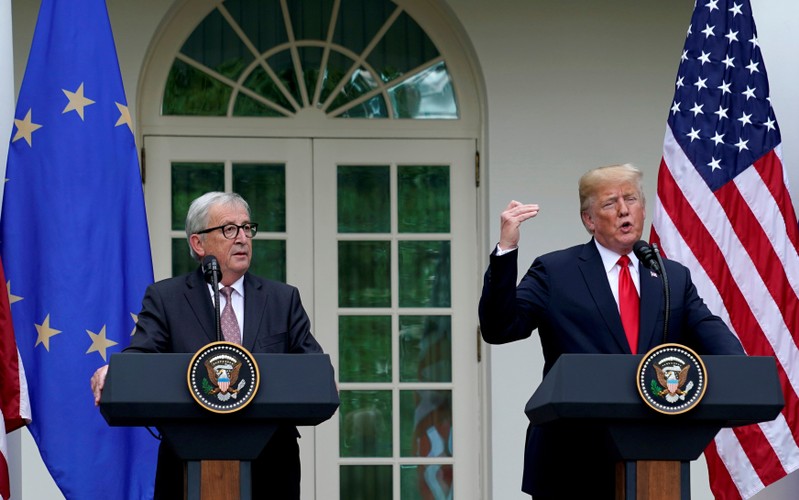
U.S. President Donald Trump and President of the European Commission Jean-Claude Juncker speak about trade relations in the Rose Garden of the White House in Washington, U.S., July 25, 2018. REUTERS/Joshua Roberts
July 8, 2019
By Andrea Shalal
WASHINGTON (Reuters) – The United States and European Union should use common sense to move forward with formal negotiations about a trade agreement, instead of allowing disagreements over agriculture to block progress, a senior German diplomat told Reuters.
Peter Beyer, a member of Chancellor Angela Merkel’s conservatives and the German government’s transatlantic coordinator, said both sides should back away from their rigid positions.
“The appeal is directed at both negotiating partners: not to use or abuse this issue of agriculture that is hanging over everything as a blockade,” Beyer said in Washington ahead of meetings with high-ranking U.S. officials from the White House and the U.S. Trade Representative’s office, and lawmakers.
The United States has insisted it will not reach a trade deal with the EU if agriculture is not included, but the EU has excluded agriculture from its mandate for the talks.
The impasse has prevented negotiations from beginning in earnest, a full year after European Commission chief Jean-Claude Juncker and U.S. President Donald Trump reached an agreement staving off punitive U.S. tariffs on EU car imports while the two sides worked to improve trade ties.
“It looks like an unsolvable situation, but it can be solved through common sense,” Beyer said. “We can at least start the formal process by excluding the topic for now, and then harvest some low-hanging fruit … Then we’ll see what happens.”
Beyer said France, Germany and other European states might ultimately have to subordinate their national interests for the sake of a broader deal for Europe.
“If Europe does not want to make itself weaker than it already is, then it must let European Realpolitik prevail,” Beyer said. “If we truly see Europe as a whole, then national interests, while understandable, may have to be put aside to some extent for the greater European good.”
Beyer said movement on a 15-year-old dispute on aircraft subsidies could boost confidence. “That would be a welcome, pragmatic, reasonable and responsible approach,” he said. “But I don’t know if it will happen.”
The EU this month said it was open to talks with Washington in the dispute over mutual claims of subsidies to Airbus <AIR.PA> and Boeing <BA.N>.
The WTO has found that the world’s two largest planemakers received billions of dollars of harmful subsidies in a pair of cases marking the world’s largest-ever corporate trade dispute.
The United States and EU have each threatened to impose billions of dollars of tit-for-tat tariffs, with Washington first in line to seek tariffs under the WTO timetable.
(Reporting by Andrea Shalal; Editing by David Gregorio)

